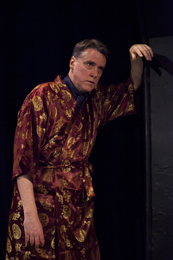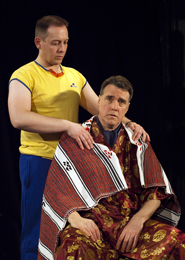Aidan Harney’s play examines a decisive moment in the life of Rock Hudson, the 1950s Hollywood heartthrob who became something more than just an icon in his final days by publicly acknowledging that he had AIDS. Hudson’s sexuality had been an open secret, carefully controlled to preserve his on-screen persona. Though the public and press were divided as to the meaning of this revelation, the balance was largely in favour of sympathy, making Hudson a kind of test case for recognition that AIDS was not a mystical Biblical plague affecting the hidden margins of society. As playwright William Hoffman (As Is) would say, “If Rock Hudson can have it, nice people can have it. It’s just a disease, not a moral affliction.”
 The moment Harney is concerned with in this two-hander is that in which Hudson comes out, both in the sense of finally shedding the heterosexual veneer and stepping into the limelight as the ‘acceptable’ public face of AIDS in Reagan’s gung-ho 1980s America. Harney builds a drama around this featuring a tired-looking, dressing-gown-clad, late 50s Hudson (Patrick Joseph Byrnes) teetering on the brink of irrelevance but just landing a plumb role in TV’s Dynasty, and his bemuscled, all-man, definitively hetero personal trainer Toby (Stewart Roche): one of Hudson’s few employees and, seemingly, friends. Toby has been concerned for some time about his client’s health, and then, as the truth becomes harder to hide, Rock tells him what’s really going on.
The moment Harney is concerned with in this two-hander is that in which Hudson comes out, both in the sense of finally shedding the heterosexual veneer and stepping into the limelight as the ‘acceptable’ public face of AIDS in Reagan’s gung-ho 1980s America. Harney builds a drama around this featuring a tired-looking, dressing-gown-clad, late 50s Hudson (Patrick Joseph Byrnes) teetering on the brink of irrelevance but just landing a plumb role in TV’s Dynasty, and his bemuscled, all-man, definitively hetero personal trainer Toby (Stewart Roche): one of Hudson’s few employees and, seemingly, friends. Toby has been concerned for some time about his client’s health, and then, as the truth becomes harder to hide, Rock tells him what’s really going on.
There’s some tentative exploration of slippages between empathy and desire as the men experience a moment of cataclysmic disturbance in their partly shared world. As Rock reminisces about his first love and the closeted desires that have denied him his true being, Toby’s wife abandons him. As Toby reflects on whether professional ethics are more important than friendship, Rock panics that a deep kiss with Linda Evans on the set might constitute a health risk. It’s all connected somewhere, but the play is both too small and too large, and never quite seems to effectively blend its public and private storylines. Toby is clearly a cipher for an ideology, and yet he is neither outsize enough nor subtle enough for the thematic feint of the cracking of his hypermasculine façade to actually work. The characterisation of Hudson is generally more effective, although most biographical accounts make a strong case for a sense of determined good humour even at this point in his life that seems absent here.
 Though there are effective moments, the play is striving for tender melancholy that it doesn’t always achieve. Sometimes it pushes too hard, forcing a pace that alternates between the intimate mundane and the politically explosive. Some scenes demand such a rapid transition of emotion that the plot begins to feel forced. At one point Roche goes from angrily screaming: “This is the sky falling in. We are fucked!” to a supportive “You can beat this,” in something briefer than a heartbeat. Director Joe Devlin and cast do what they can with it, but I’m not entirely convinced Harney has really nailed this topic in this form. As a lunchtime two-hander it feels both too long and too short. It often feels disjunctive and imbalanced, as if scenes are missing and some of those retained might have been better off left out, like a rough draft that needs another run.
Though there are effective moments, the play is striving for tender melancholy that it doesn’t always achieve. Sometimes it pushes too hard, forcing a pace that alternates between the intimate mundane and the politically explosive. Some scenes demand such a rapid transition of emotion that the plot begins to feel forced. At one point Roche goes from angrily screaming: “This is the sky falling in. We are fucked!” to a supportive “You can beat this,” in something briefer than a heartbeat. Director Joe Devlin and cast do what they can with it, but I’m not entirely convinced Harney has really nailed this topic in this form. As a lunchtime two-hander it feels both too long and too short. It often feels disjunctive and imbalanced, as if scenes are missing and some of those retained might have been better off left out, like a rough draft that needs another run.
The play’s best scene is the nicely played moment when Toby reads Linda Evans’ lines from Dynasty in a faux-feminine voice and Rock becomes ‘Rock’ the hypermasculine lothario. The interplay between real and fake, masculine and feminine, and public and private is nicely realised as a play within a play that gives formal heft to the theme of performance and roleplay, and both Byrnes and Roche play it beautifully. Unfortunately, much of the rest of the play is less elegant in shifting its various registers. The result is not uninteresting, but never as involving as it ought to be given the considerable heart with which it seems to have been mounted.
Harvey O'Brien